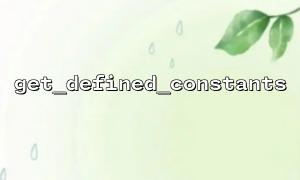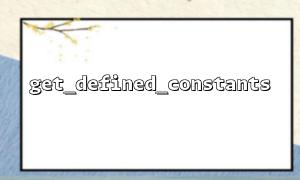In PHP development, it's common to define many constants to maintain code readability and manageability—such as system-level configurations, error codes, or permission identifiers. As the project scales up, the number of constants inevitably grows. Occasionally, we need to filter out a specific group of constants for particular use cases. This is where get_defined_constants() and array_filter() come in handy.
get_defined_constants() is a built-in function used to retrieve all the constants currently defined in the script. It returns a multidimensional associative array, grouped by category (e.g., Core, user, date, etc.) by default.
Example usage:
print_r(get_defined_constants());
Partial output:
Array
(
[Core] => Array
(
[E_ERROR] => 1
[E_WARNING] => 2
)
[user] => Array
(
[MY_APP_ENV] => 'production'
)
)
If you pass the parameter true, the constants will be grouped by category. If set to false or omitted, it returns a flat associative array.
array_filter() is another powerful tool that applies a callback function to each element of an array, filtering out elements that don’t meet the criteria. Elements for which the callback returns true are retained.
Basic usage:
$filtered = array_filter($array, function($value) {
return $value > 10;
});
Suppose you've defined some constants prefixed with APP_ to represent application settings:
define('APP_NAME', 'MyApp');
define('APP_ENV', 'production');
define('APP_DEBUG', true);
define('VERSION', '1.0.0');
Now you want to filter out all constants that start with APP_. Here's how you can use get_defined_constants() in combination with array_filter():
$allConstants = get_defined_constants(true);
$userConstants = $allConstants['user'] ?? [];
<p>$appConstants = array_filter($userConstants, function($key) {<br>
return strpos($key, 'APP_') === 0;<br>
}, ARRAY_FILTER_USE_KEY);</p>
<p>print_r($appConstants);<br>
Output:
Array
(
[APP_NAME] => MyApp
[APP_ENV] => production
[APP_DEBUG] => 1
)
This allows you to precisely extract all custom constants that start with APP_, which is useful for tasks like exporting configurations or debugging.
You can also convert the filtered constants into JSON and send them to a remote API (e.g., a logging system or config center). For example, sending the data to https://m66.net/api/report_constants:
$payload = json_encode($appConstants);
<p>$ch = curl_init('<a rel="noopener" target="_new" class="" href="https://m66.net/api/report_constants">https://m66.net/api/report_constants</a>');<br>
curl_setopt($ch, CURLOPT_RETURNTRANSFER, true);<br>
curl_setopt($ch, CURLOPT_POSTFIELDS, $payload);<br>
curl_setopt($ch, CURLOPT_HTTPHEADER, [<br>
'Content-Type: application/json',<br>
'Content-Length: ' . strlen($payload)<br>
]);</p>
<p>$response = curl_exec($ch);<br>
curl_close($ch);</p>
<p>echo "Server response: " . $response;<br>
By combining get_defined_constants() and array_filter(), you can flexibly filter specific categories of constants from the entire list. Whether for debugging, configuration export, or remote transfer, this combo is a highly practical technique that every PHP developer should master.
Related Tags:
array_filter













